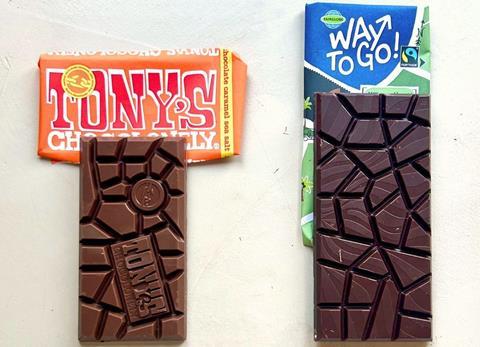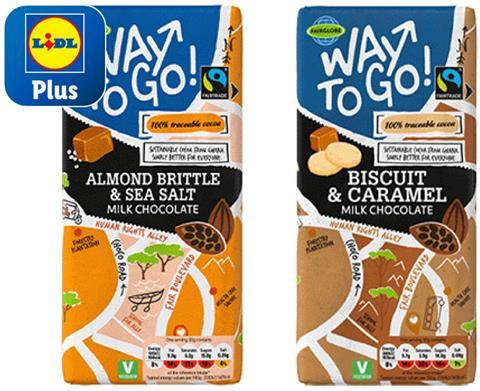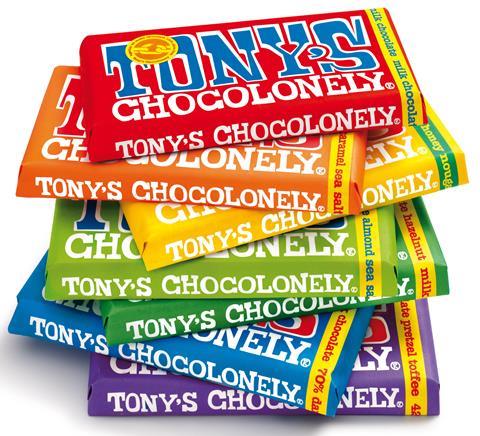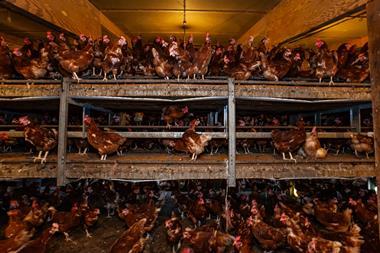
Tony’s Chocolonely, the chocolate brand known for its ethical sourcing principles, has challenged Lidl to show it meets the same standards with a copycat version.
Lidl’s Way To Go bar mimics Tony’s irregularly shaped sections, adopted by the ethical chocolate brand to represent inequality in cocoa sourcing.
A Tony’s spokesperson has said it “doesn’t feel right” for Lidl to copy the design without also copying its entire sourcing principles.
Tony’s commits to five sourcing principles including paying a living income price while also committing to at least five years of sales to provide security. The principles also include trading directly with farmers to ensure traceability, and investing in skills and innovation to improve sustainability.
Tony’s shares the five principles in an open chain initiative, enabling other big players to adopt the same standard. Aldi and Waitrose have signed up for own-label launches, but Lidl has not.

“If you are going to do a brand copycat our only ask is that on the sourcing side you copy Tony’s five sourcing principles too,” Tony’s spokesperson told The Grocer.
“We exist to end exploitation in cocoa, and our sourcing method is designed to deliver that, if all in the cocoa industry participate.
“Our unequally divided bar serves as a reminder that the cocoa supply chain is unequal. So, to copy this mission ‘device’, but not our entire sourcing principles – or better yet, join Tony’s Open Chain – doesn’t feel right.”
Lidl’s bar, which it is promoting in its latest weekly leaflet to coincide with Fairtrade Fortnight, also makes claims to ethical sourcing.
Cocoa farmers are paid a Fairtrade premium on top of the Fairtrade minimum price, meaning they get extra to invest in their farms and communities, while the beans are from a growing co-operative in Ghana and 100% traceable, according to Lidl. It then pays an additional amount on every tonne of cocoa bought, to support farmers in growing more crops and help secure their livelihoods.
Tony’s spokesperson said: “Based on some of Lidl’s front-of-pack claims we would be interested to see if in this instance they are paying a living income price – now and over the long term as cocoa markets fluctuate – for all their cocoa.”
The spokesperson said Tony’s would also be keen to see whether Lidl had detailed school attendance and child labour rates for all its farms to substantiate a front-of-pack ‘school for all’ reference.
“We know that Tony’s Chocolonely won’t ever be 100% of all the chocolate sold globally, so once we had enough evidence that our five sourcing principles were working, instead of keeping them for ourselves, we decided to share them with all our competitors in order to accelerate our mission of ending exploitation across the whole cocoa industry,” the spokesperson added.
“So, in 2019, we launched Tony’s Open Chain, a B2B cocoa bean sourcing business. TOC means that any brand or private label retailer who wants to buy our ethically sourced, living income-paid cocoa beans can do so at exactly the same price as Tony’s Chocolonely pays.
“We would welcome talking to Lidl about getting real deal beans through TOC so we can work towards ending exploitation in cocoa together.”
Read more:
-
How discounters are getting away with copycatting food brands
-
Aldi brings back chocolate bar meeting Tony’s Chocolonely’s ethical sourcing commitments
A Lidl spokeswoman said: “Way To Go is our Fairtrade-certified own-brand range and its core aims are to make the cocoa and other raw materials supply chain even fairer. We developed the Way To Go strategy and concept together with Fairtrade following a risks and needs based approach.

“Lidl is committed to supporting living incomes in countries where high-risk raw materials are sourced. For the Way To Go quantities purchased by Lidl, we add an additional Lidl Income Improvement Premium (IIP) on top of the Fairtrade minimum price and the Fairtrade premium. This IIP is based on the Fairtrade Living Income Reference Price methodology and is composed of a direct payment as well as the financing of project activities in the cooperatives.
“The project activities that are funded through the IIP reflect our goal to empower small-scale farming households within the cooperatives, helping them pursue income diversification and growth opportunities. Together with Fairtrade, we tailor these income improvement measures on the specific needs and risks faced by farmers.
“To secure the future of the livelihood for farmers, we focus on diversification and preventive measures to adapt to climate change and more sustainable cultivation methods, helping to secure the environmental and economic basis for the cultivation and distribution of the respective Way To Go raw materials. We also address important social issues, such as gender equity, the protection of women and children, and occupational health and safety.”
She added: “All our Way To Go products are fully traceable back to their respective cooperatives, and we are continually working to increase this transparency. Regular reporting, analysis, and assessments help us evaluate the impact of our efforts and guide our future focus. Long-term supplier commitments are key to our Way To Go concept, ensuring income security for farmers.”
She said Lidl had also extended the approach to other supply chains including those of coffee, cashews and orange juice, in collaboration with Fairtrade.
The Way To Go bar costs £2.69 for 180g, or currently £2.20 with the Lidl Plus loyalty app. The bar first went on sale on 2020.
Tony’s chocolate bars sell in a number of major supermarkets for £3.50, also for a 180g bar.
It is the latest in a string of rows over copycat discounter versions of branded products. In 2021, Lidl was ordered by a court to temporarily withdraw its Hampstead gin from stores across Scotland, following a challenge from Hendrick’s.
Aldi has been in a number of similar run-ins. In one of the latest disputes, cider brand Thatchers failed in a High Court trademark infringement claim against Aldi over the discounter’s Taurus Cloudy Lemon Cider in January this year. And in one of the most high-profile, Aldi was found in High Court last year to have infringed M&S’s registered designs for a range of gin-based liqueurs.



















No comments yet